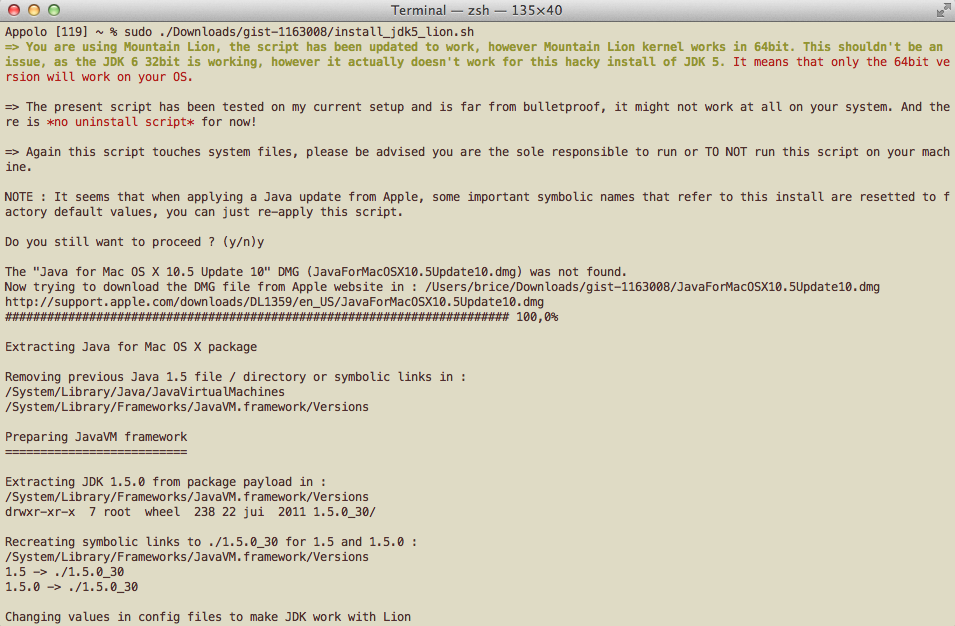
- #JAVA MAC OS X LION 10.7 2 HOW TO#
- #JAVA MAC OS X LION 10.7 2 FOR MAC#
- #JAVA MAC OS X LION 10.7 2 MAC OS X#
- #JAVA MAC OS X LION 10.7 2 UPGRADE#
Just a tip for forum use, duplicate threads are normally frowned upon, but if you are in a situation where you post a question and then add further information your thread shows in forum helpers filters as answered, and so is unlikely to attract further answers. How do I share Firefox between people on a computer?.
#JAVA MAC OS X LION 10.7 2 HOW TO#
#JAVA MAC OS X LION 10.7 2 MAC OS X#
#JAVA MAC OS X LION 10.7 2 FOR MAC#
Does Firefox for Mac still not support Lion-style scrollbars?.NVIDIA Corporation - NVIDIA GeForce 8600M GT OpenGL Engine - 2.1 NVIDIA-7.18.11 Mozilla/5.0 (Macintosh Intel Mac OS X 10.7 rv:12.0) Gecko/20100101 Firefox/12.0Ĭookie Bookmarks in New Modified Preferencesī_size_cached_valueī_override.buildIDĭom.disable_window_open_feature.scrollbars

There are Universal versions of JavaApplicationStub floating around, and it's possible to cook up your own using the lipo command, but the odds are if you're reading a Lion tip, that's the least of your worries. Note that the JavaApplicationStub included in Lion is i386 and x86_64 ONLY, so if you somehow share app bundles with a PPC version of MacOS, this procedure will make the Java app no longer useable on PPC. I've found that renaming or moving the app bundle or force-quitting Finder (or plain-old rebooting) will cause the app to be re-parsed and allow it to launch. It does seem that Finder and/or LaunchServices hold on to the status of a binary even after the transplant is complete. Close out of the app bundle, and you should be done. If the original binary had a different name, you should use that exact name instead of JavaApplicationStub. System/Library/Frameworks/amework/Resources/MacOS/JavaApplicationStub. Rename the existing binary to something else, just in case (JavaApplicationStub-ppc perhaps), then copy the new version from: If it's named something else, it's still possible that it's a renamed copy of JavaApplicationStub, but you may run into problems. If it's named 'JavaApplicationStub,' you should be good to go. Inside Contents is a folder called MacOS, and in there you should find the binary. If you right-click the app bundle and choose 'Show Package Contents,' you'll see a Contents folder inside the bundle. Once the transplant is complete, the applications should launch and run just fine under Lion.įirst, you'll want to check that your app is indeed suffering from this exact problem.


#JAVA MAC OS X LION 10.7 2 UPGRADE#
These apps show up with the dreaded 'international symbol for time to upgrade your software' on their icon and give the 'You can't open the application Foo.app because PowerPC applications are no longer supported,' error when launched.įortunately, because this stub binary is common to all applications, you can safely replace the old PPC-only copy inside the app bundle with an updated copy that contains Intel code. Since this stub binary is common to all such applications, many Java apps (even recently released ones) are bundled with a PPC-only version of this stub. app bundle while still running Java code in JAR files. Many MacOS-bundled Java applications use Apple's own JavaApplicationStub as their binary to allow packaging in a proper. A quick 'stub' transplant can often bring these apps back to life. With the death of Rosetta in Lion, many older bundled Java applications (.app's) no longer launch.


 0 kommentar(er)
0 kommentar(er)
